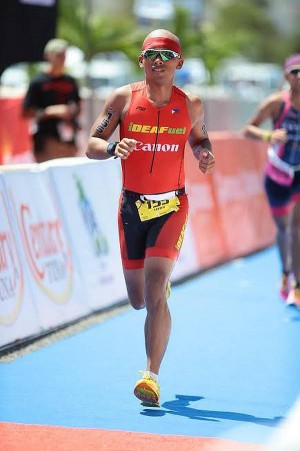
Lagos (Contributed photo)
Finishing the Cobra Ironman 70.3 triathlon was just the start for 30-year-old Batangas-native Lester Lagos.
Lagos visited deaf children at Zapatera Elementary School and high schools in Cebu to start an educational fitness program.
“I was a bit emotional seeing them overjoyed. They were inspired by my past achievements, that even as a deaf man, I managed to break boundaries,” said Lagos.
He said triathlon sports impart important life lessons, especially for those who overcome physical disabilities.
While growing up, Lagos said he had to overcome self-esteem issues by learning never to underestimate oneself.
Overcome
“I want to tell kids that their disability is their strength, and that they can overcome any boundary if they believe they can,” he said.
Lagos, founder of the Philippine Aquatic Sports Federation for the Deaf, began swimming just as he began losing his ability to hear at the age of 5.
He had to grow up with hearing aids and speech therapy for more than a decade, to help him distinguish words and to explore the world without the sense of hearing.
Despite his hearing impairment, Lagos graduated from high school and finished college with a degree in Multimedia Arts from the De La Salle College of Saint Benilde in Manila in 2007.
Lagos competed in local and international tournaments, including the Asia Pacific Deaf Games in South Korea last 2012.
A year later, Lagos was awarded the Most Outstanding PWD of Makati City by Makati City Mayor Jejomar “Junjun” Binay Jr. Lagos then switched to triathlon sports — swimming, biking and running.
“Being a triathlete means you have to be a professional in all aspects of day-to-day health, and be smart about health training, and being an all-around athlete,” he said.
Dreams
Now working with John Paul Maunes of the Philippine Accessible Deaf Services (PADS), Lagos said they will set up a swimming workshop for deaf children in Cebu to start off the educational fitness program.
“There are so many deaf children here in Cebu who are willing to take part in the swimming program, and compete in the future, but do not have enough resources to do so,” Lagos said.
Lagos with students of the Zapatera National High School. (CONTRIBUTED PHOTO)
From there, they can explore other fitness programs with hearing coaches in the country, to create a full-blown fitness program for children with special education needs.
“It has always been my dream to encourage PWD children, especially in athletic communities, that not being able to hear, or having a disability should not stop you from reaching your dreams,” Lagos said./ UP Cebu Intern Juli Ann Sibi